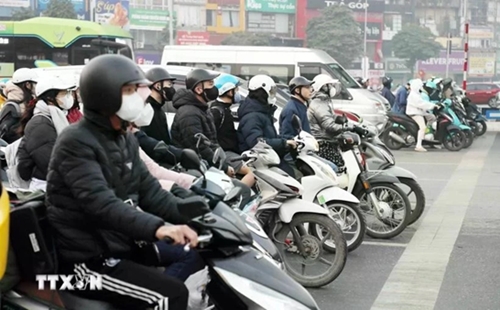The freshly ended break (from January 25 to February 2), also the annual longest, witnessed a nationwide mass migration. Complaints surfaced, blaming Decree 168 – which significantly increases penalties for various traffic offences – for road congestion. However, these criticisms have failed to hold up against the hard data.
    |
 |
|
People stop at the red light on a street. |
According to the Ministry of Public Security’s Traffic Police Department, traffic accidents nationwide during the nine-day holiday dropped by nearly 37% compared to the previous Tet period (down 258 cases). The number of injuries and fatalities decreased by 232 and 126 or 38.34% and 37.61%, respectively.
The broader impact of the decree was evident even before the holiday rush. Between January 1 and 15, the total number of traffic accidents went down by 34%, while related deaths dropped by 11%, and injuries by 34%, compared to the same period in 2024.
The two major cities, Hanoi and Ho Chi Minh City, also recorded a substantial fall in traffic accidents after the decree came into effect on the first day of 2025.
Hanoi reported 21, six and 31 fewer accidents, fatalities, and injuries during this year’s Tet holiday compared to last year’s, respectively. The decreases for Ho Chi Minh City were 10, seven, and four.
The National Traffic Safety Committee highlighted a particularly sharp decline in alcohol-related violations during the recent Tet, by 45.6% against the similar period in 2024.
The committee attributed these improvements to the proactive and decisive leadership of the Prime Minister and the Government, to the early planning and implementation of measures to ensure traffic safety and passenger transport across all sectors, and to enhanced monitoring and enforcement with close coordination between the police, traffic inspectors, and local authorities.
Throughout the holiday, the Ministry of Public Security deployed 24/7 patrols, targeting drunk driving, speeding, and drug-related offences.
Colonel Nguyen Quang Nhat, head of the Traffic Police Department’s communications office, remarked that strict enforcement of the law on road traffic safety and Decree 168 has had a positive impact, leading to greater public compliance with regulations. This is evidenced by a more than 40% reduction in recorded violations compared to the same period last year, a compelling statistic that debunks misleading claims suggesting the new regulations are merely a revenue-generating tool through hefty fines.
Yet, challenges remain. Nearly 56,000 violations were detected during Tet, leading to VND 172 billion (USD 6.82 million) in fines. Authorities revoked nearly 3,000 driver’s licenses, deducted points from 7,000 others, and temporarily seized 428 cars and 21,000 motorbikes.
From January 25 to 10am on February 2, the country still recorded 445 traffic accidents, resulting in 209 deaths and 373 injuries, while over 17,000 cases of drunk driving were detected.
The early success of Decree 168 is undeniable. However, authorities must not become complacent or prematurely satisfied with initial successes. Instead, they must maintain firm enforcement of the law on road traffic safety and Decree 168, ensuring strict penalties for violations to safeguard public health, protect lives, and uphold social order.
Source: VNA